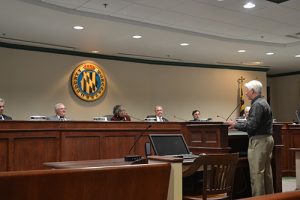
SNOW HILL – The Worcester County Commissioners agreed this week to work an appeal process into a resolution establishing standard sewer flow calculations.
After lengthy discussion Tuesday, the commissioners voted unanimously to incorporate an appeal process into the proposed policy setting standard flow calculations. Though county staff opposed any sort of reconsideration process, the commissioners disagreed.
“I just want to make sure that we get it right no matter how we do it,” Commissioner Josh Nordstrom said. “I understand you guys are saying we’re getting it right now but other people feel differently. If there’s some proof that they’re not using as much as they’re allocated or as much as they’re paying for upfront or down the road I think there should be an appeals process and I think it should be codified.”
County staff members have spent months developing standard flow calculations that they believe will streamline the EDU (equivalent dwelling unit) allocation process. The commissioners asked staff to incorporate a reconsideration process into the resolution after local developers pointed out that with no opportunity for review, they could be forced to pay for significantly more sewer capacity than they use.
Staff members drafted language incorporating a review process into the resolution but stressed this week that they did not recommend passing that version of resolution.
“The sewer committee believes that a reconsideration process reintroduces uncertainty to the process for which we are attempting to establish standards upon which developers, residents business owners and staff can rely upon to ensure that adequate wastewater treatment capacity is available now and in the future to serve all customers in the service area,” Assistant Chief Administrative Officer Kelly Shannahan wrote in his report to the commissioners.
Commissioner Jim Bunting said that if a developer could prove they were using less capacity than they were paying for, there should be a process in place to review that allocation.
“I think we should work with them rather than against them,” he said.
Staff, however, said they’d developed the figures in the resolution based on years of research and experience.
“We did not do it in a vacuum,” said Bob Mitchell, the county’s director of environmental programs.
When the commissioners opened a public hearing on the proposed resolution, however, attorney Mark Cropper said the reconsideration language staff had presented the commissioners with wouldn’t accomplish anything.
“The process which was supposed to be a reconsideration or appeal process in the revision is called an audit,” he said. “The initial allocation is by staff. The developer disagrees with staff. The audit process in the revision is by staff.”
He said that if a developer disagreed with staff over usage there should be someone other than staff to review that developer’s appeal.
“You can’t have staff reviewing its own determination because it’s that determination that’s being challenged,” he said.
Developer Palmer Gillis spoke about the importance of getting the flow chart regarding usage correct. Gillis, who’s known for developing medical offices, added that other jurisdictions were willing to reconsider allocations when he could provide proof regarding a particular project’s water and sewer usage.
“Every jurisdiction I deal with — except for Easton, being brutally honest — has discretion if I can provide evidence of that,” he said.
Gillis suggested the county work with local developers in drafting the standard flow calculations.
Maureen Howarth, the county attorney, advised against that. She pointed out that the county’s top staff had drafted the policy.
Commissioner Joe Mitrecic said he thought there should be a way for an allocation decision to be appealed but didn’t want the issue to come in front of the commissioners for resolution.
“I would really like to keep it out from in front of us so it doesn’t become a political football,” he said.
He made a motion to add language to the proposed policy that would allow appeals, first to staff then to the county’s board of appeals. Commissioner Chip Bertino said he liked the idea but wanted to see it in writing before the standard flow resolution was officially approved.
The commissioners voted 7-0 to add the language Mitrecic requested to the resolution so it could be considered at their next meeting.

